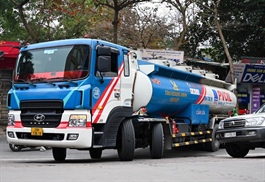MoIT rejects rumour of gasoline price hitting VND100,000 per litre
MoIT rejects rumour of gasoline price hitting VND100,000 per litre
The Ministry of Industry and Trade (MoIT) rejected a rumour that gasoline price could go as high as VND100,000 (US$4) per litre after it was circulated on a number of social media platforms.

MoIT has been working closely with the Ministry of Finance, the other partner in a joint authority to manage fuel prices in Viet Nam, since the beginning of the year to support fuel traders and to ensure a stable and ample supply to all fuel stations across the country, according to the ministry.
The two ministries have been in the middle of a review process to determine fuel prices and further adjustments are expected to address traders' grievances regarding financial losses and difficulty in securing supply.
Fuel prices in Viet Nam largely followed free-market principles with minimal intervention by the state, according to MoIT deputy minister Do Thang Hai.
Addressing the grievances, the deputy minister said the global oil market had become disrupted with prices fluctuating in large margins since the beginning of the year. It had made some traders import fuel in much larger quantities than usual, sometimes at significantly higher costs.
As oil prices went down, fuel prices in the domestic market started stabilising and eventually returned to the previous year's level. As traders' profits suffered, they were forced to cut bonuses to retailers.
The state had no say in traders' incentives given to retailers but it had an obligation to set retail prices as fuel is considered an essential commodity with a significant influence on inflation and other macroeconomic factors.
As for retailers' ongoing financial difficulties, the ministry had recommended several solutions to the Government and measures should be implemented quickly to help resolve them.
In a response to recent calls to scrap the country's petrol stabilisation fund, Hai said the fund was still needed to manage and stabilise socio-economic activities, at least for the near future.
Some industry experts have also voiced support for keeping the fund, saying it serves as a cushion in periods in which the global oil prices are volatile, preventing domestic prices from shooting up uncontrollably.
Other factors include rising operational costs, primarily influenced by logistics, which has affected most economic sectors.
Meanwhile, the Ministry of Finance has asked traders to produce cost reports to help determine the range of potential price adjustments in the future. The finance ministry's stance, for the time being, is that adjustments are necessary to support traders and retailers but they can only roll out incrementally during price cycles, which are set at 10 days per current regulations.
Petrol prices surge in latest adjustment
The retail price of RON 95-III bio-fuel almost reached VND24,000 (US$0.97) per litre from 3pm on Friday, following the latest adjustment by the Ministries of Industry and Trade, and Finance.
Specifically, the retail price of RON 95-III increased by VND1,110 to VND23,860 per litre, and that of E5 RON 92 climbed to VND22,710 per litre, up VND840.
Diesel 0.05S is now sold at VND24,980 per litre, down VND90, while the price of kerosene and mazut rose by VND960 and VND680 to VND24,740 per litre and VND14,760 per kilo, respectively.
The two ministries also decided to extract VND200 per litre, and VND300 per litre from petrol and mazut prices for the petrol price stabilisation fund.

























